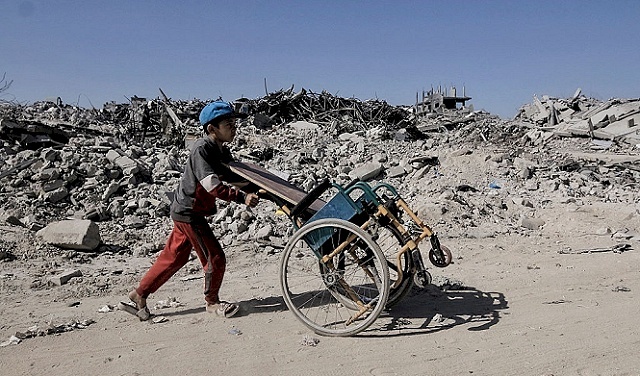
Top News
UNICEF warns of losing an entire generation amidst the collapse of the education sector in Gaza
SadaNews - Edward Bégbédé, UNICEF's regional director for the Middle East, warned of the danger of losing an entire generation in the besieged and devastated Gaza Strip, where the education system is experiencing a "collapse" after two years of war.
Bégbédé said on Thursday in Jerusalem, after returning from the region, "This is the third year without schools," adding, "If we do not start a real transition for all children in February, we will reach a fourth year, and then we can talk about a lost generation."
The official pointed out that with the ceasefire taking effect on October 10, UNICEF and its partners in the education sector managed to "bring back about one-sixth of the children who should be in school to temporary learning spaces."
However, he was speaking about learning, not education, noting that "85% of schools have been destroyed or are unfit for use," while many of the remaining schools are being used as shelters for displaced persons.
Children and teachers also face ongoing transportation difficulties due to displacement and military operations, while most teachers are preoccupied with securing food and water for their families.
The school system in Gaza, where nearly half the population is under eighteen before the outbreak of war on October 7, 2023, was already suffering from overcrowding.
According to Bégbédé, out of about 300 schools belonging to the Palestinian Authority, about 80 need rehabilitation, while "142 schools have been completely destroyed" and "38 schools are entirely inaccessible" because they are located in areas where the Israeli army is stationed.
"Race Against Time"
Temporary learning centers are set up in schools or near displacement camps, inside tents or makeshift rooms that lack even windows.
Where chairs, cardboard boxes, or wooden planks are sometimes used as tables, Bégbédé said, "I have never seen everyone sitting comfortably," noting that some children sit on the ground or on mats, writing on boards or even on pieces of stone or plastic.
He added that lessons "are provided in a rotating schedule for three days a week, for a few hours either in the morning or afternoon" and include only three subjects: mathematics, reading, and writing.
He remarked that "the aim is not to sever ties with education, to keep the children resilient," considering it a "race against time" to "bring education back to the forefront of priorities."
He continued that education is a "means of restoring social cohesion" for children, all of whom almost suffer from psychological trauma and need support.
Dr. Hanan Belkhi from the World Health Organization had warned last year of the "huge impact on the mental health" of children in Gaza and the "spread of post-traumatic disorders."
For its part, the United Nations Relief and Works Agency for Palestine Refugees (UNRWA) announced on October 18 the launch of the "new academic year online" aimed at reaching 290,000 students.
However, U.S. Secretary of State Marco Rubio stated on Friday that UNRWA, "which has become an arm of Hamas, will have no role" after the war.
Israel has banned the agency's operations, claiming that some of its employees participated in the October 7 attack, accusations rejected by the International Court of Justice as baseless.
"Hope"
Bégbédé clarified that one of the main priorities is to allow Israel to permit the entry of construction materials necessary for establishing semi-permanent schools, in addition to educational supplies considered non-essential from its perspective.
The World Health Organization confirmed on Thursday that humanitarian aid entering Gaza remains "insufficient," and that "hunger is not decreasing."
Bégbédé questioned, "How can classrooms be rehabilitated without cement? We also need notebooks, books, tools, and the minimum necessary stationery."
He added, "Food is a matter of survival, while education is hope."
He noted that he was deeply affected by what he described as the determination of the Gazan community to "reorganize its life, clean up the rubble, reopen small shops, and try to restore aspects of life."
However, he also expressed "shock" at the level of destruction, saying, "It is hard to imagine that 80% of the sector's land has been almost completely flattened," with only "small pockets of buildings remaining here and there."
Read Also

Israel Continues Its Alertness and Anticipates a Limited U.S. Strike on Iran That Will Not...

Trump: 'Hamas' Will Disarm

Yedioth Ahronoth: The Disarmament Operation of Hamas and Factions Begins Next March

Martyr in Israeli Airstrike in Central Gaza Strip

Saudi Arabia Emphasizes Ensuring Institutional and Geographical Link between Gaza and the...

Occupation hands over the remains of 15 martyrs from the residents of Gaza Strip

The European Union Rejects Settler Attacks and Calls for Accountability for Those Responsi...

